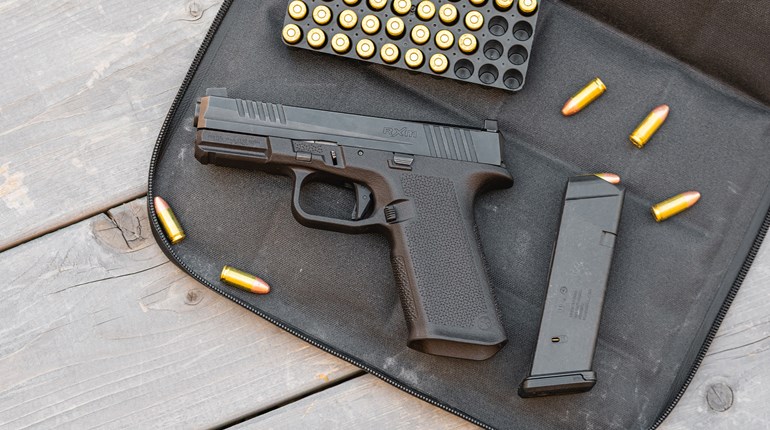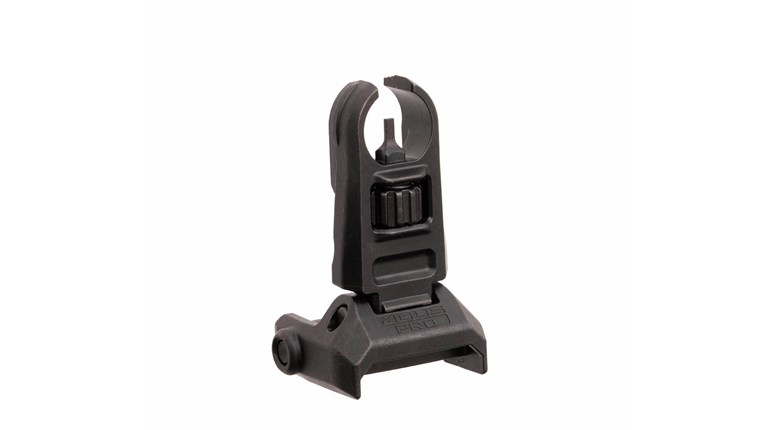
This feature appears in the August ’16 issue of NRA America’s 1st Freedom, one of the official journals of the National Rifle Association.
The Windham Weaponry Multi-Caliber rifle system puts as many as four useful calibers in the same rifle case, and burnishes our belief that these savvy Yankees can package value like few others.
We understand why non-shooters are so often befuddled by the mammoth variety in the world of firearms. Even experienced shooters find themselves somewhat confused now and again as they determine which apparatus is best suited to perform a given shooting task. Leavened with discipline—particularly in terms of effectiveness and safety—making such a determination is also a substantial part of the fun and durable intellectual appeal of shooting.

This would seem to render firearms that permit ready caliber exchanges very desirable. As a technical matter, however, such conversions are often more daunting than expected. Many attempts seemed to favor the native caliber, with reliability, accuracy or other disappointments characterizing the swap-ins. Happily, three smart guys named Stoner, Fremont and Sullivan kicked us a long stretch down this road in the 1950s (believe it or not)—even if unintentionally. As the forerunner of the Modern Sporting Rifle, revisions to their original AR-10 design are proving to be quick-change artists of rare accomplishment.
Granted, folks have been swapping alternate caliber “uppers” onto their MSR lowers for a long time now—several years ago, our own count ran out of steam at more than 60 calibers for the two base action lengths (AR-10 and AR-15). Make no mistake: The upper swap remains a superb solution for many requirements. But especially when considering cost, it’s a relatively expensive one, as you duplicate roughly a third of the rifle every time you add an alternate caliber. This estimate ignores the need for a sighting kit of some kind for each of those uppers, too.
As the Windham Weaponry Multi-Caliber System (MCS) so superbly demonstrates, a lot of that duplication can now be a thing of the past. Where a traditional upper swap requires the alternate caliber to have its own upper receiver to mate the barrel (and perhaps bolt and bolt carrier) with the lower, the MCS uses the MGI twin lever locking system to reduce the swap to the actual caliber-dependent parts: barrel and bolt assembly. Your upper, handguard and sights can remain the same—indeed, remain installed—through a caliber change.
To change calibers, simply remove any magazine and unload the rifle, lock the bolt open, open a safety “bale” on a locking block below the barrel in front of the magwell, slide it forward along the Picatinny rail, and turn two locking levers out 90 degrees to either side. The barrel, gas block and gas tube slide easily forward and out of the upper receiver and handguard. Reinstallation is the convenient no-hammerin’-or-cussin’ reverse. Almost any cartridge of compatible overall length could be adapted to the MSR given a correctly dimensioned chamber/bore and bolt assembly, but getting feed reliability—the heart of the semi-automatic—has been a long-standing stumbling block.

The Windham addresses feeding in similarly clever fashion. Instead of trying to adapt the curved magazine for an intermediate rifle cartridge, say, or a straight pistol-caliber magazine to the existing MSR/AR magwell geometry, the MCR swaps the magwell itself to accommodate caliber-optimized loading devices. You read that correctly: For 7.62x39, for instance, the MCR will use an actual AK mag; for 9 mm, a Colt-type straight carbine magazine. This exchange is even simpler than the barrel swap. Just unload the rifle and remove the upper (same two pins as virtually all others), use the provided tool or a small punch to drop the front of the trigger guard, and press the magazine release. Up slides the outgoing caliber magwell configuration, down slides your incoming. Reposition the trigger guard and, voilà, caliber swap complete.
Perhaps it’s obvious already, but we think the MCS rifle executed by Windham is outstanding in the mechanical sense, but it’s all for naught if the thing won’t shoot and feed—the traditional downfall of many caliber-change systems. Feeding-wise, we get to be cheerfully brief. For us, all calibers ran ultra-reliably from the outset (see “Nuts And Bolts” for the lone hiccup).

Where the rubber really meets the road in such systems is how point of impact fares between barrel removals and reinstallations. We didn’t expect match rifle performance given all the extra mechanical necessities that are in play, but darn near got it anyway. Our groups hovered at an inch in each caliber (and sometimes well better), even with barrel de/reinstalls midway through. Very different ballistics for various cartridges mean you can’t hold zero between caliber changes, of course, but with a little good recordkeeping, we see no reason why the precision of the MCS won’t let you dial these in as you change calibers. We did, and we generally stayed at one MOA-like variations through swap after swap after swap. An EOTech Vudu 1-6x24 ffp prototype (exceptional too, by the by!) made this easy and worked precisely in all four calibers.
If that’s a pinch too much techno babble, we’ll restate in a nutshell: More modern sporting rifle versatility than a Windham MCS offers will be very hard to come by—and particularly for the investment.
Nuts And Bolts
The MCS is available from Windham Weaponry in two-, three- and four-caliber versions. Ours was the latter, and started with a “PCC” (pistol caliber carbine) 9 mm blowback action, followed by three direct impingement systems to handle 7.62x39, 5.56x45/.223 Remington and .300 Blackout.

Our only functioning issue came in 9 mm, and it was a strange one. If we loaded the magazine with anything more than two rounds, we got flawless functioning and decent accuracy (we were out of our best accuracy-producing 9 mm Sierras; sigh). But on two occasions when we tried to load a single round, a misfeed occurred. We never did work out why. But two out of many hundreds of rounds? Needless to say, we lost no sleep. This had the feel of a wear-in issue too, so concerned us even less.
In the rifle calibers, we encountered no such difficulties. 7.62x39, 5.56 and .300 Blackout were all 100 percent. Our AK mags are all Magpuls—as is the supplied magazine—and were a tad tight in the conversion magwell. This took a small technique accommodation to be quick, but was hardly a struggle. Like the 9 mm issue, we’d expect this to substantially moderate after a break-in period.
A last thought if an MCS is appealing to you more and more: Remember that the system enforces no limits on “complete upper” caliber choices beyond the Windham offerings. Our 69-grain Match Gorilla Ammunition .223 hovered right at half an MOA over and over again, so needing a better barrel, for instance, may never come up. But don’t get it in your head that a rifle you buy for the sake of superb versatility is somehow locking you out of other MSR enhancements. A huge array of triggers, stocks, optics—even high twist rate barrels—are still very much at your fingertips with a Windham Weaponry MCS.


































